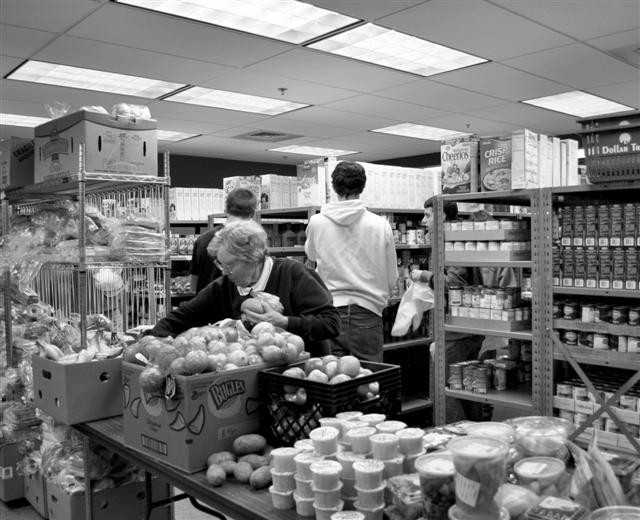In Lake County, 11.7 percent of people and 21.8 percent of children are food insecure, according to Feeding America 2011 statistics. They do not have access to enough food to live a healthy and active lifestyle, but local food pantries are trying to end that hunger.
Food pantries such as St. Vincent de Paul food pantry (SVDP), located in St. Francis de Sales’s ministry center, have one main goal in mind: to feed their neighbors and help struggling families through the tough economy.
“By providing food at no cost to our neighbors, we can help these families meet their rent or mortgage payments and [give] them enough money to fill their cars with gas,” Mary Gibadlo, volunteer coordinator at SVDP, said.
SVDP has served 534 households in the last month, and each week gives 40 to 50 pounds of food to each person or family in need.
“Our goal is to never turn anyone away hungry,” Gibadlo said. “We serve everybody, from every walk of life, and lately we are seeing an uprising of families that do own a home and are looking to make ends meet.”
According to Gibadlo, due to the poor economy, more and more middle class families are using the food pantries so they can pay their bills and provide food for their families.
“Food pantries give [the clients] a sense of belonging to something, and something to fall back on,” Olivia Pesce, junior and food pantry volunteer, said. “All of the people there, receiving food, are all very thankful and you can tell the volunteers really care about them.”
Food pantries rely on volunteers to help serve and supply the community. SVDP has 174 volunteers and 30 to 40 volunteers every Thursday to distribute the food.
“It was eye opening,” Nicole Bianchi, junior and food pantry volunteer, said. “Seeing all the people in your community that need help makes you realize all the things you have to be grateful for. Most of the students here at LZ don’t get to see people who may not have the things that they have and [are] in need.”
In 2010, 4.8 percent of U.S. households (5.6 million households) accessed emergency food from a food pantry more than once.
“Food pantries give people struggling to pay their bills’ one less thing to worry about,” Maddie Minneci, sophomore and food pantry volunteer, said. “You never know, it could be you one day who needs the extra help.

